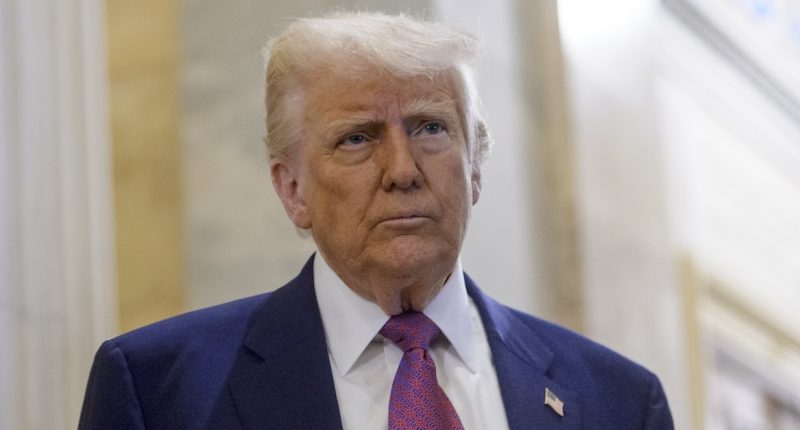Share this @internewscast.com
President Donald Trump speaks to reporters upon arriving for a meeting with the House Republican Conference at the Capitol on Tuesday, May 20, 2025, in Washington (AP Photo/Rod Lamkey, Jr.).
A federal judge in Texas has mandated that the Trump administration disclose essential information regarding its interactions with Salvadoran officials concerning deportations under the Alien Enemies Act (AEA).
In two different orders issued this week, U.S. District Judge Keith P. Ellison, appointed by Bill Clinton, required the government to undertake a comprehensive list of actions following an emergency motion filed by lawyers for 24-year-old Venezuelan refugee Widmer Josneyder Agelviz-Sanguino.
Filed under seal, a petition for a writ of habeas corpus was submitted by Agelviz-Sanguino’s legal team earlier this month after his name appeared on a flight manifest of the 238 men sent to the notorious prison in El Salvador known as the Center for Terrorism Confinement (CECOT).
Now, the judge’s orders could reveal information about the prison’s inner workings — if an already-lodged challenge is rejected by a court of appeals.
Love true crime? Sign up for our newsletter, The Law&Crime Docket, to get the latest real-life crime stories delivered right to your inbox.
On Monday, following a hearing, Ellison issued an order requiring the government to confirm Agelviz-Sanguino’s whereabouts and establishing his access to legal counsel.
The initial order required the government to file a declaration within 24 hours “confirming the current location and health status of Agelviz-Sanguino, as well as the legal basis for his continued detention.” Additionally, the judge required the government to restore “and help maintain attorney-client communication between Agelviz-Sanguino and his counsel” as well as provide his legal team with “direct contact information” for CECOT “including a designated point of contact responsible for ensuring compliance” within 48 hours.
The order also required a progress report of sorts, to be filed within 72 hours, detailing the steps the government took to comply with the order “including any logistical arrangements made with El Salvadoran authorities.”
The judge, however, foresaw some issues.
The initial order offers the following caveats, at length:
If Defendants claim an inability to facilitate communication due to lack of control over El Salvadoran facilities, they must:
i. Set forth in a declaration all efforts made to secure cooperation, including through diplomatic or contractual channels.
ii. Disclose all agreements or arrangements with El Salvador (or any agency or sub-division otherwise involved) related to Agelviz-Sanguino’s detention, including any memoranda of understanding with, or funding ties to CECOT.
On Tuesday, U.S. Attorney General Pam Bondi filed a motion for an extension of time to comply with the court’s order — which Ellison quickly granted. The government received until 11:59 p.m. on Wednesday to comply with the section of the order requiring confirmation of the plaintiff’s whereabouts.
On Wednesday, the government filed another motion for an extension of time and, again, received quick permission. Ellison also extended the deadline for the part of order granting Agelviz-Sanguino contact with his attorneys — again until 11:59 p.m. on Wednesday.
Also on Wednesday, the government filed, under seal, documents attesting to its efforts to comply with the court’s order.
But the judge was clearly not impressed.
“Defendants’ declaration provided no meaningful information regarding Plaintiff Agelviz-Sanguino’s location, health, or the legal basis for his detention,” the court noted late Wednesday. “The U.S. Embassy’s purported inquiry to El Salvadoran authorities—unsupported by details or evidence—does not satisfy the Court’s previous order.”
In his supplementary order compelling compliance, Ellison considerably upped the ante on the Trump administration.
The newer order requires a “declaration describing all actions taken by Defendants and the U.S. Embassy since May 19, 2025” and mandates some granular details like “[n]ames/titles of El Salvadoran officials contacted, methods of contact, and copies of all written communications” as well as a “[t]imeline of follow-up attempts and plans to escalate such attempts if no response is received.”
The court also wants the government to delve into the laws undergirding Agelviz-Sanguino’s continued detention in CECOT.
Ellison said the government’s next filing should include the “specific El Salvadoran law cited as justification for Agelviz-Sanguino’s detention” including the name of the statute, its article number, English translation and “verification of its applicability to Venezuelan nationals.”
This homework assignment also includes a requirement that the Trump administration analyze Salvadoran law’s “compliance with its own international obligations.” For example, the judge says, this analysis should include a section on U.S. obligations under the international non-refoulement regime — the international legal principle, codified in various treaties and agreements, that individuals should not be deported to places where their lives are in danger.
The court also demanded a series of documents including “[a]ll agreements or contracts between the U.S. and El Salvador” that have to do with the “transfer, detention, or treatment of individuals deported from the U.S. to El Salvador (including any memoranda of understanding with CECOT)” as well as the “[c]riteria for selecting deportees sent to El Salvador (vs. other destinations or detention centers)” and the “[e]xpected duration of detention in El Salvador.”
Finally, Ellison told the government to provide Agelviz-Sanguino’s deportation records — and specified several relevant pieces of information.
The order lists these requests, at length:
i. The factual and legal basis for his detention and removal from the United States under the Alien Enemies Act or any other authority.
ii. The factual and legal basis for his removal to El Salvador specifically.
iii. The dates, manner, and locations Agelviz-Sanguino was detained in U.S. custody.
iv. The date, manner, and location of his handover to El Salvadoran authorities.
v. The last known contact the U.S. Government, or any agent of the U.S. Government, has had with Agelviz-Sanguino.
vi. Any due process afforded to Agelviz-Sanguino (e.g., notice to counsel, opportunity to contest removal, applicable timeline).
The extent of the requested information Ellison will actually receive, however, is exceedingly unclear.
The Trump administration has been serially loathe to provide courts or attorneys with details — accurate or otherwise — about AEA prisoners in various other cases.
And, on Thursday, the Department of Justice filed notice that it intends to appeal Ellison’s latest court order to the U.S. Court of Appeals for the 5th Circuit — the nation’s most conservative appellate court which has, itself, been skeptical of challenges to the government’s use of the AEA.

















